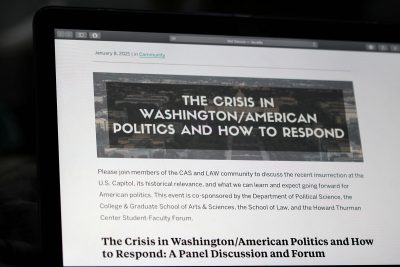A mob of pro-Trump rioters stormed through the U.S. Capitol Jan. 6, marking the first time the building has been breached since the War of 1812. With lawmakers evacuated from the chambers, offices vandalized and shots fired, the urgency to address the attack was not lost on Boston University.

The College of Arts and Sciences, School of Law and Department of Political Science gathered for a panel Monday night titled “The Crisis in Washington/American Politics and How to Respond: A Panel Discussion and Forum.” The event was also co-sponsored by CAS, the Graduate School of Arts and Sciences and the Howard Thurman Center Student-Faculty Forum.
Associate Provost and Dean of Students Kenneth Elmore sent an email with the event information to all students on Sunday, along with a personal letter that denounced the “forces of hatred and racism” that incited the Capitol violence.
The virtual panel featured seven panelists from the departments of political science, women’s, gender and sexuality studies and the law school. More than 260 people attended the event.
The discussion began with a welcome address from the Dean of Arts and Sciences Emerita and Professor Virginia Sapiro. Though the audience could not be face to face, Sapiro said the panel hoped to create an intimate environment for the faculty experts to discuss and better understand the current political tumult.
“What we wanted to do was to get people together to talk about the issues of the last few weeks,” Sapiro said at the event, “but also the deeper concerns about how American politics is functioning, democracy and a whole lot of other important issues.”
During the panel, each speaker presented on the crisis from their expertise, and participants then could ask follow-up questions and join breakout rooms for further discussion.
Panelist Karen Pita Loor, the associate dean for experiential education and a clinical associate professor of law, offered her perspective on the mob’s controversial police interactions based on her research and work on police violence.
“I want to say that you’re not imagining it, that the media is not spinning it,” Loor said. “The reception given to mostly white Trump loyalists last week was completely different than the way that law enforcement in D.C. prepared like warriors and treated as violent enemies Black Lives Matters protesters.”
She added that this double standard was not only evident Wednesday, but throughout the whole year.
“For weeks, far-right activists were having public discussions on social media about their plans to come to the Capitol,” she said. “The disparate treatment we saw, did not only happen in Washington D.C. but across the nation over 2020.”
Taylor Boas, an associate professor of political science, compared the far-right movement in the United States with that in Germany.
“In general, there seems to be an increasing penetration of far-right movements among law enforcement and military in the United States,” Boas said. “But the political will to combat this problem is much more readily found in a country such as Germany, which has a multi-party system.”
He said the U.S.’s two-party system makes the far right “effectively part of the Republican base.”
Though coups in the U.S. are not typical, Boas said officials investigating the crisis at the Capitol can learn from Turkey’s mistakes in handling its military’s 2016 coup attempt — the country’s investigation was “widely and correctly perceived as a witch hunt.”
Echoing heated public discussions on Trump’s second impeachment, Sapiro further explained what invoking the 25th Amendment would mean for the presidency.
“The 25th Amendment to the Constitution provides a process to declare the president incapable of carrying on his duties, removing him from his powers and placing them on the vice president.” Sapior said during the panel.
As Sapiro predicted, the House voted to officially call on Vice President Mike Pence to invoke the amendment on Tuesday night.
“How further it will go,” she said, “who knows.”
Sapiro wrote in an email after the event that she thinks education is one essential way to protect democracy, and hopes students continue to stay engaged in social and political issues in the future.
“It is important for all citizens to become as knowledgeable and engaged as possible in the politics and social issues of their day.” Sapior wrote. “The quality of democracy depends on this knowledge and engagement, not just at election time, but in between as well.”
Clara Martiny, a senior in the Frederick S. Pardee School of Global Studies studying international relations, said she thinks calling attention to national events through University panels and discussions makes an impact on the student community.
“I think webinars like that are so useful,” Martiny said. “It’s really important to have those different perspectives to help understand what happened and how we can prevent it from happening again.”
Martiny also said that in the future, the administration should hold “a stronger stance” on critical issues to continue to support students.
“I understand that universities and administrations have to stay neutral,” Martiny said, “but [there are] some cases where it’s actually good to stand up and be the first to break that mold and say something different and support your students.”



















































































































